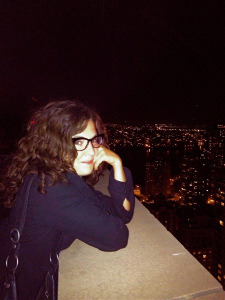Sleep Smarter, Nurses!
This guest post was written by Jasmin Zaman, a student at the Hunter-Bellevue School of Nursing and the Macaulay Honors College at the City University of New York. Last fall Jasmin took a course in narrative writing for nursing students at Hunter taught by CHMP senior fellows Joy Jacobson and Jim Stubenrauch.
11:46 PM … 12:45 AM … 3:30 AM …
Here we go again. As I toss and turn I lose my hopes of getting eight hours of sleep. It’s Tuesday night. That means tomorrow morning I have to meet my classmates at the lobby of the Hunter dorms to make it to our 7:55 AM meeting for clinicals next door. We have our psychiatric rotations at Bellevue, and I am desperate to catch up on as much sleep as I can.
I was against caffeine when I first entered college but on Tuesday morning I haul my fatigued body to the nearby caffeine watering hole—Dunkin Donuts. My mother always warned me about the evil grasp of coffee and energy drinks, as she believed they were the culprits of my unexplained heart palpitations.

Nursing student Jasmin Zaman and friend
Suffering from insomnia is something I have come to accept. I share this constant battle with my classmates, and it is comforting to know I am not alone. We become so consumed by the day’s activities and by tomorrow’s schedule that it is almost bizarre to just stop—and sleep. Not sleeping the day before clinical days, especially, is a recipe for disaster. An internal disaster. My body fights itself to understand the cause of this sleep deprivation. Without the stimulant effects of coffee my body shuts down. I have often caught myself dozing off on the floor. But if I move into the maintenance phase of caffeination with stimulants like Red Bull or other energy drinks, I’m contributing to my sleeplessness throughout the night.
Studies have shown that the classic theory of sleeping one-third of the day does not correlate with feeling well-rested. Factors such as age and lifestyle contribute to the quality of sleep and feeling rested. It does not matter how much sleep you get, but rather the quality of it. Quality over quantity is best. Rapid eye movement, or REM, sleep, considered one of the most crucial stages of the sleep cycle, is “the only phase of sleep during which the brain is as active as it is when we are fully conscious, and seems to offer our brains the best chance to come up with new ideas and hone recently acquired skills,” says David Randall in a an op-ed, “Rethinking Sleep.”
This guest post was written by Jasmin Zaman, a student at the Hunter-Bellevue School of Nursing and the Macaulay Honors College at the City University of New York. Last fall Jasmin took a course in narrative writing for nursing students at Hunter taught by CHMP senior fellows Joy Jacobson and Jim Stubenrauch.
11:46 PM … 12:45 AM … 3:30 AM …
Here we go again. As I toss and turn I lose my hopes of getting eight hours of sleep. It’s Tuesday night. That means tomorrow morning I have to meet my classmates at the lobby of the Hunter dorms to make it to our 7:55 AM meeting for clinicals next door. We have our psychiatric rotations at Bellevue, and I am desperate to catch up on as much sleep as I can.
I was against caffeine when I first entered college but on Tuesday morning I haul my fatigued body to the nearby caffeine watering hole—Dunkin Donuts. My mother always warned me about the evil grasp of coffee and energy drinks, as she believed they were the culprits of my unexplained heart palpitations.

Nursing student Jasmin Zaman and friend
Suffering from insomnia is something I have come to accept. I share this constant battle with my classmates, and it is comforting to know I am not alone. We become so consumed by the day’s activities and by tomorrow’s schedule that it is almost bizarre to just stop—and sleep. Not sleeping the day before clinical days, especially, is a recipe for disaster. An internal disaster. My body fights itself to understand the cause of this sleep deprivation. Without the stimulant effects of coffee my body shuts down. I have often caught myself dozing off on the floor. But if I move into the maintenance phase of caffeination with stimulants like Red Bull or other energy drinks, I’m contributing to my sleeplessness throughout the night.
Studies have shown that the classic theory of sleeping one-third of the day does not correlate with feeling well-rested. Factors such as age and lifestyle contribute to the quality of sleep and feeling rested. It does not matter how much sleep you get, but rather the quality of it. Quality over quantity is best. Rapid eye movement, or REM, sleep, considered one of the most crucial stages of the sleep cycle, is “the only phase of sleep during which the brain is as active as it is when we are fully conscious, and seems to offer our brains the best chance to come up with new ideas and hone recently acquired skills,” says David Randall in a an op-ed, “Rethinking Sleep.”
Where are the Nursing Stories?
Amanda Anderson, RN, BSN, CCRN, a native-Buffalonian-turned-New-Yorker, is celebrating her 6th Birthday as a MICU nurse this June. She’s currently shooting for two master’s degrees from Hunter Bellevue’s award-winning nursing school, writing with students and for herself, and dodging yellow cabs while speeding around the city on her little bike. Follow her musings here, via @12hourRN, and on her blog www.thisnursewonders.wordpress.com.


But some mornings, if I push past it all and glue myself
down, my story is there, singing its way into existence. Pieces of it, lines of it, waves of text and feeling and thought. Past the distraction of the newspaper landing on my doorstep, the plants asking me for water, last night’s dishes crowding the sink.
This morning, I’m following the fleeting voice of my story like Alice, running through Wonderland in search of that crazy cat. I’ve managed to get the coffee brewing, I’ve warded off my internet addiction for a moment, and here I am.
I’m thinking about a woman I met with yesterday, a grad student and professional nurse. This woman is much older than I, has a family, and a well-established nursing career here in New York. She is studying in a graduate program at Hunter, and our paths crossed last night because, for professional experience and a small pittance, I help graduate students write papers. Despite moderately solid writing, this student’s latest paper happened to garner extra attention from her professor. For plagiarism.
Amanda Anderson, RN, BSN, CCRN, a native-Buffalonian-turned-New-Yorker, is celebrating her 6th Birthday as a MICU nurse this June. She’s currently shooting for two master’s degrees from Hunter Bellevue’s award-winning nursing school, writing with students and for herself, and dodging yellow cabs while speeding around the city on her little bike. Follow her musings here, via @12hourRN, and on her blog www.thisnursewonders.wordpress.com.


But some mornings, if I push past it all and glue myself
down, my story is there, singing its way into existence. Pieces of it, lines of it, waves of text and feeling and thought. Past the distraction of the newspaper landing on my doorstep, the plants asking me for water, last night’s dishes crowding the sink.
This morning, I’m following the fleeting voice of my story like Alice, running through Wonderland in search of that crazy cat. I’ve managed to get the coffee brewing, I’ve warded off my internet addiction for a moment, and here I am.
I’m thinking about a woman I met with yesterday, a grad student and professional nurse. This woman is much older than I, has a family, and a well-established nursing career here in New York. She is studying in a graduate program at Hunter, and our paths crossed last night because, for professional experience and a small pittance, I help graduate students write papers. Despite moderately solid writing, this student’s latest paper happened to garner extra attention from her professor. For plagiarism.
- 1
- 2
- 3
- 4
- 5
- 6
- 7
- 8
- 9
- 10
- 11
- 12
- 13
- 14
- 15
- 16
- 17
- 18
- 19
- 20
- 21
- 22
- 23
- 24
- 25
- 26
- 27
- 28
- 29
- 30
- 31
- 32
- 33
- 34
- 35
- 36
- 37
- 38
- 39
- 40
- 41
- 42
- 43
- 44
- 45
- 46
- 47
- 48
- 49
- 50
- 51
- 52
- 53
- 54
- 55
- 56
- 57
- 58
- 59
- 60
- 61
- 62
- 63
- 64
- 65
- 66
- 67
- 68
- 69
- 70
- 71
- 72
- 73
- 74
- 75
- 76
- 77
- 78
- 79
- 80
- 81
- 82
- 83
- 84
- 85
- 86
- 87
- 88
- 89
- 90
- 91
- 92
- 93
- 94
- 95
- 96
- 97
- 98
- 99
- 100
- 101
- 102
- 103
- 104
- 105
- 106
- 107
- 108
- 109
- 110
- 111
- 112
- 113
- 114
- 115
- 116
- 117
- 118
- 119
- 120
- 121
- 122
- 123
- 124
- 125
- 126
- 127
- 128
- 129
- 130
- 131
- 132
- 133
- 134
- 135
- 136
- 137
- 138
- 139
- 140
- 141
- 142
- 143
- 144
- 145
- 146
- 147
- 148
- 149
- 150
- 151
- 152
- 153
- 154
- 155
- 156
- 157
- 158
- 159
- 160
- 161
- 162
- 163
- 164
- 165
- 166
- 167
- 168
- 169
- 170
- 171
- 172
- 173
- 174
- 175
- 176
- 177
- 178
- 179
- 180
- 181
- 182
- 183
- 184
- 185
- 186
- 187
- 188
- 189
- 190
- 191
- 192
- 193
- 194
- 195
- 196
- 197
- 198
- 199
- 200
- 201
- 202
- 203
- 204
- 205
- 206
- 207
- 208
- 209
- 210
- 211
- 212
- 213
- 214
- 215
- 216
- 217
- 218
- 219
- 220
- 221
- 222
- 223
- 224
- 225
- 226
- 227
- 228
- 229
- 230
- 231
- 232
- 233
- 234
- 235
- 236
- 237
- 238
- 239
- 240
- 241
- 242
- 243
- 244
- 245
- 246
- 247
- 248
- 249
- 250
- 251
- 252
- 253
- 254
- 255
- 256
- 257
- 258
- 259
- 260
- 261
- 262
- 263
- 264
- 265
- 266
- 267
- 268
- 269
- 270
- 271
- 272
- 273
- 274
- 275
- 276
- 277
- 278
- 279
- 280
- 281
- 282
- 283
- 284
- 285
- 286
- 287
- 288
- 289
- 290
- 291
- 292
- 293
- 294
- 295
- 296
- 297
- 298
- 299
- 300
- 301
- 302
- 303
- 304
- 305
- 306
- 307
- 308
- 309
- 310
- 311
- 312
- 313
- 314
- 315
- 316
- 317
- 318
- 319
- 320
- 321
- 322
- 323
- 324
- 325
- 326
- 327
- 328
- 329
- 330
- 331
- 332
- 333
- 334
- 335
- 336
- 337
- 338
- 339
- 340
- 341
- 342
- 343
- 344
- 345
- 346
- 347
- 348
- 349
- 350
- 351
- 352
- 353
- 354
- 355
- 356
- 357
- 358
- 359
- 360
- 361
- 362
- 363
- 364
- 365
- 366
- 367
- 368
- 369




